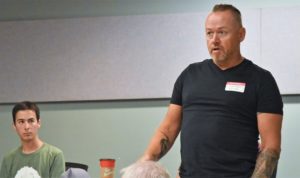Nipissing First Nation Chief determined to have First Nations included as full partners in cannabis industry

By Kelly Anne Smith
NIPISSING FIRST NATION— Nipissing First Nation (NFN) citizens have been asked for input on a proposed cannabis grow-op to operate on their territory.
The deadline for citizens to send in a written submission of “legitimate concerns or valid objections” is set for October 9.
The NFN Business Licence Review Committee received a business licence application for an indoor cannabis grow operation to open on Highway 17 property at the off-ramp for Highway 17B. It is in accordance with Health Canada Regulations and Nipissing First Nation’s Cannabis Law.
The same deadline holds for a second community consultation on a retail cannabis space to be located in the Bineshii Business Park. The cannabis store must comply with the NFN Cannabis Law and the Alcohol and Gaming Commission of Ontario regulations regarding cannabis retail store operations.
Meanwhile, Nipissing First Nation Chief Scott McLeod is determined to have First Nations included as full partners in the budding cannabis industry.
Recently at a North Bay town hall meeting, Chief McLeod asked Federal Minister of Border Security and Organized Crime Reduction Bill Blair for more resources for Nipissing First Nation to enforce public safety. Chief McLeod also stressed the need for access to a legal supply of cannabis for potential profits for First Nations.
Chief Scott McLeod was encouraged after a private meeting with Minister Blair.
“We don’t deal nation-to-province. We deal nation-to-nation. He got that mention loud and clear,” stated Chief McLeod. “The one thing I stressed to him was that we are not the same and a one-size-fits-all solution is not going to work. I explained to him the things that we have done in the past, things that we have already done on cannabis and the laws, and the protection measures that we have in place and models for enforcement that we have been reviewing. He had a better understanding of where we are coming from I think.”
NFN got a commitment from Minister Blair to meet again.
“Although we didn’t come out with anything concrete, what we came out with was a commitment for some time with him and his staff to get this thing moving forward. It’s encouraging but I’ll reserve my excitement until have some type of bilateral agreement with the federal government.”
Chief McLeod flew to Vancouver to attend the Assembly of First Nations Cannabis Summit held September 4-5. He says the common thread at the AFN Cannabis Summit was the issues of jurisdiction and sovereignty for First Nations.
“The hurdle seems to be trying to get a tripartite agreement. There are overlapping jurisdictions when it comes to retail,” explains Chief McLeod. “First Nations have the sovereignty and jurisdiction to create laws and govern cannabis over their own lands but the problem is if we were simply going to sell to our community members and other first nations, there probably wouldn’t be any issue. But that’s not really going to stimulate any type of economic gain for First Nation’s communities.”
Chief McLeod explained that selling to non-residents and non-First Nation’s people in the outlying areas becomes a competition for revenue or tax dollars for provincial jurisdictions.
“We have to all sit down at the table and figure out how we can do this so that everybody is happy. How do we design this in a way that we can still get the economic gain so that the province can still get their revenues through sales tax?”
Chief McLeod says First Nations are sitting on the sidelines.
“The options are quite simple. Either First Nations head into the gray market area where the province and the federal government don’t get anything or we work out an agreement where everybody gets a cut and we are legitimate players in a fully recognized market.”
On the first day of the AFN Cannabis summit, National Chief Perry Bellegarde used the term “economic racism” for being left out of the market. Chief McLeod agrees.
“I don’t know what else to call it when we are excluded as Indigenous People from the legislation and the process. This just shows that systematic racism is alive and well in Canada.”


